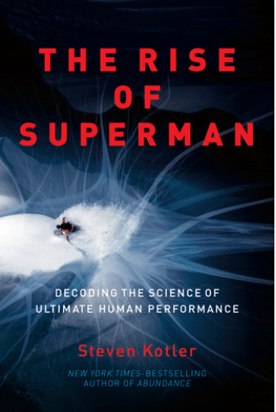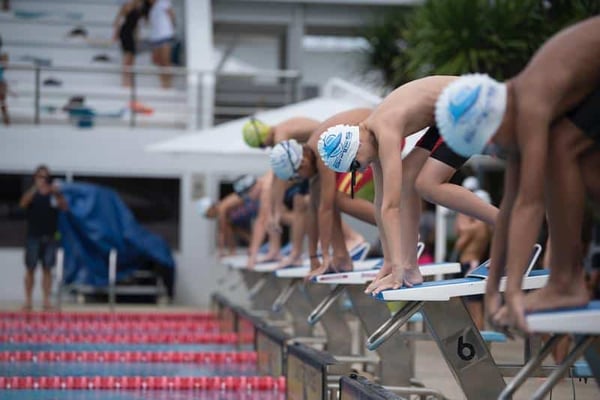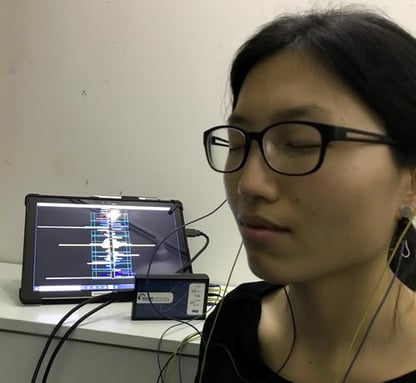We are excited to have Performance Coach, Chris Morgan, author of 7 Levels of Performance: The Athelete Playbook for Getting into the Zone guest blog for us on flow state and peak performance.
Maybe you're giving a presentation to your boss, and you are so well prepared that the right words seem to flow automatically. Or it's the last game of the season, you're dribbling down the court and shoot without even thinking about it. Have you ever had an experience like this? The whole event seems surreal and effortless, as if time was standing still.
These are descriptions of an experience called the “flow state”. When it is with a group of people, it’s called “group flow”. In both the individual and group settings, flow is the highest level of peak performance that human beings can achieve.
What is a Flow State?
Psychologist Mihaly Csikszentmihalyi was one of the first researchers to write about the flow state in his book, Flow. He studied hundreds of artists, athletes, and other peak performers to distill all the properties and ingredients of flow. One of the key themes from Mihaly’s research is that flow is the highest peak performance state--not only because you perform at your best, but also because you feel your best.
 In his book, The Rise of Superman, Steve Kotler expounds upon many aspects of the flow state, including some of these key benefits:
In his book, The Rise of Superman, Steve Kotler expounds upon many aspects of the flow state, including some of these key benefits:
- Increased risk taking: risk taking becomes less frightening
- Decline of the Inner-Critic: losing your introspective sense of self-awareness and over-analyzation
- Boosting creativity: creativity and self-expression increases
- Maximizing strength: pushing our maximal strength closer to its absolute boundary
Not only do you have the sense of effortlessness, creativity and timelessness, but you also can dive into taking risks without fear, totally immerse yourself in what you are doing and push your strength to the limits.
That is impressive stuff.
Also Watch:
How does the Flow state Work?
In flow, your brain switches into a state called “transient hypofrontality”, which is a fancy way of saying that parts of your prefrontal cortex (PFC), the executive decision-maker and analytical-thinker in your brain, become less active.
Specifically, the dorsolateral prefrontal cortex (DLPC), which is responsible for risk-assessment and impulse control, quiets down. This means that your “inner-critic”--that voice that whispers all the ‘what-ifs’ that could go wrong and criticizes you for every mistake-- shuts up. This state makes it easier to just go for it without hesitation and to make split second decisions without all the analysis to trip you up.
When the DLPFC quiets down, a different part of the PFC becomes more active: the medial prefrontal cortex (MPFC), which is responsible for personality expression (among other things as well). This means that, when your inner-critic is silenced, you can be more fully yourself. All the worry about how people perceive you and what sorts of “mistakes” you “might” make melt away.
In short, the brain switches from being a logical, critical decision-maker to a more creative, intuitive decision-maker when you are in flow. Neither state is better than the other per se; both serve their respective purposes for different aspects of life.
Also Read:
How to induce Flow
How do you get more flow in your life by choice, and not by chance? There are several key practices that you can implement in your life to start making this state more likely to happen on purpose.
1. Become More Competent
First, become more competent at your activity. “Competency equals confidence” is a saying for a reason. The flow state, as pointed out by Csikszentmihalyi, requires your skill level to be at par with the challenge at hand. So, the musician, athlete or working professional who wants to have more flow in their work should make sure they are training all the requisite skills needed for their goals.
In general, to reaching flow requires you to be competent with the materials and skills of presenting. Flow is not a replacement for skill, but rather an optimization of already present competencies. Achieving flow means effortlessly achieving your full potential during a performance or test. It allows you to block out the negative self-talk and worries that inhibit your success, thus enabling you to totally demonstrate your talents.
Also Watch:
2. Create a Ritual
Create a pre-event ritual. While competence is necessary for flow, it isn’t always sufficient. Before important events, like business presentations or athletic performances, you can still experience nerves and stress. That inner critic starts to become active and you get worried about what might go wrong.
High levels of nervousness can block flow. In order to reduce those nerves, create a pre-event ritual that gets you into a state of relaxation and boosts the likelihood of getting into flow. For instance, 30-60 minutes beforehand, focus on a singular stimulus for 5 – 10 minutes. The stimulus can really be anything--popular stimuli include breathing or a short mantra that you repeat to yourself. Also, focus on process-based goals that you can directly control, rather than outcomes you can’t (e.g., allowing for effective pauses in your presentation, rather than worrying what other people might be thinking of you).
3. Do Your Inner Work
Do inner work on your self. Flow blocks exist at the unconscious level (the part of the mind that is operates below conscious thinking). Just like you don’t think about how to tie your shoes anymore, you aren't aware about many of the beliefs and values that govern your decisions and actions. But some of these beliefs and values might be creating significant blocks to getting into flow.
Doing inner-work on yourself, such as re-wiring beliefs through affirmations (short statements like “I am unstoppable”) is very important to increasing the likelihood of flow. Even repeating these affirmations just a few times a day can add up to hundreds of times over several weeks. Small steps make big differences!
Many peak performers also find that working with a trained performance professional shortens the time it takes to retrain your unconscious mind.
Learn mindfulness meditation to achieve state of flow
 4. Train your brain
4. Train your brain
Train your brain with neurofeedback technology like NeurOptimal®. It is a great choice to help with creating flow because of its unique approach to brain optimization. Unlike other technologies, it doesn’t “force” your brain to behave in certain ways , but rather gives feedback and allows your brain to adapt and grow the way it wants to. Because of this unique design, NeurOptimal® allows for greater optimization of the creative and self-expressive aspects of flow. What to know about neurofeedback training and how it works.
When you combine all four steps together, you prepare your mind to experience flow.